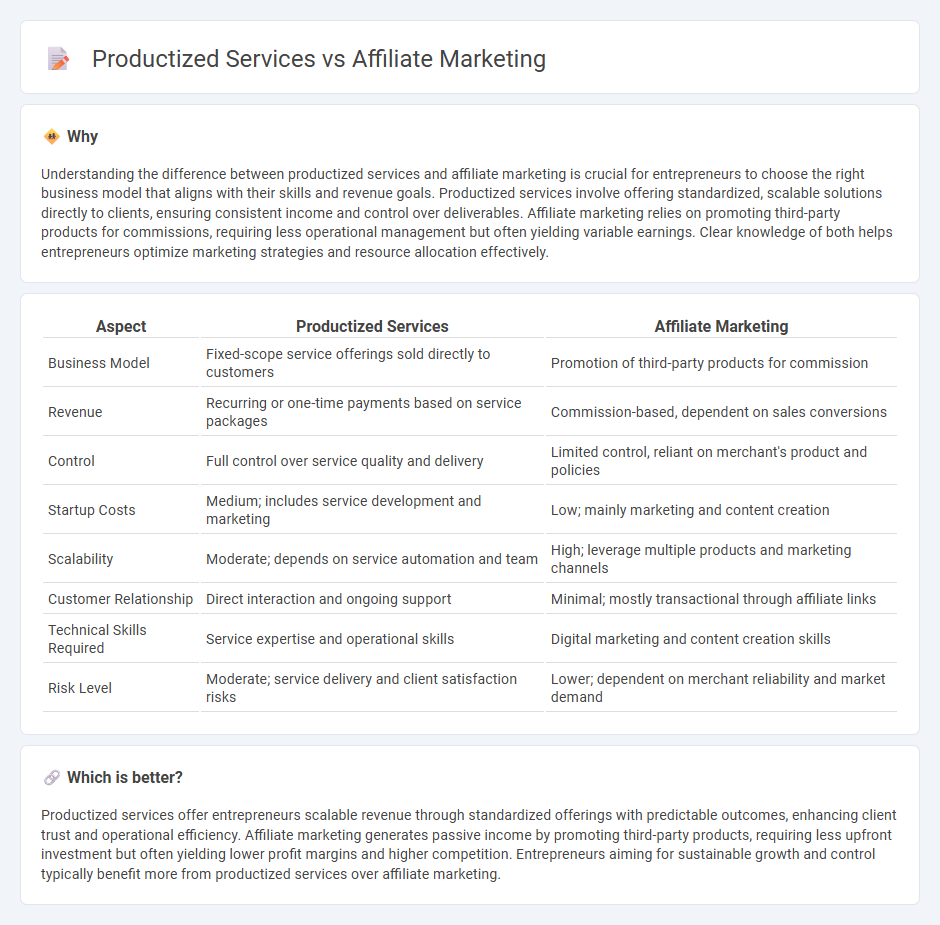
Productized services offer entrepreneurs a scalable business model by packaging expertise into standardized, sellable solutions that streamline delivery and increase profit margins. Affiliate marketing relies on promoting third-party products, earning commissions based on sales without the need to create or manage inventory. Explore the advantages and challenges of each approach to determine which best suits your entrepreneurial goals.
Why it is important
Understanding the difference between productized services and affiliate marketing is crucial for entrepreneurs to choose the right business model that aligns with their skills and revenue goals. Productized services involve offering standardized, scalable solutions directly to clients, ensuring consistent income and control over deliverables. Affiliate marketing relies on promoting third-party products for commissions, requiring less operational management but often yielding variable earnings. Clear knowledge of both helps entrepreneurs optimize marketing strategies and resource allocation effectively.
Comparison Table
| Aspect | Productized Services | Affiliate Marketing |
|---|---|---|
| Business Model | Fixed-scope service offerings sold directly to customers | Promotion of third-party products for commission |
| Revenue | Recurring or one-time payments based on service packages | Commission-based, dependent on sales conversions |
| Control | Full control over service quality and delivery | Limited control, reliant on merchant's product and policies |
| Startup Costs | Medium; includes service development and marketing | Low; mainly marketing and content creation |
| Scalability | Moderate; depends on service automation and team | High; leverage multiple products and marketing channels |
| Customer Relationship | Direct interaction and ongoing support | Minimal; mostly transactional through affiliate links |
| Technical Skills Required | Service expertise and operational skills | Digital marketing and content creation skills |
| Risk Level | Moderate; service delivery and client satisfaction risks | Lower; dependent on merchant reliability and market demand |
Which is better?
Productized services offer entrepreneurs scalable revenue through standardized offerings with predictable outcomes, enhancing client trust and operational efficiency. Affiliate marketing generates passive income by promoting third-party products, requiring less upfront investment but often yielding lower profit margins and higher competition. Entrepreneurs aiming for sustainable growth and control typically benefit more from productized services over affiliate marketing.
Connection
Productized services streamline consultancy offerings into fixed-scope packages, enhancing scalability and efficiency for entrepreneurs. Affiliate marketing leverages these standardized services by promoting them through affiliate partners who earn commissions on sales. This connection creates a symbiotic ecosystem where productized services gain broader market reach and affiliates generate income by driving targeted traffic and conversions.
Key Terms
Commission Structure
Affiliate marketing typically involves earning a percentage-based commission on sales generated through referral links, allowing marketers to earn passive income without handling product delivery. Productized services, on the other hand, employ a fixed or tiered pricing model, offering predictable revenue by selling standardized service packages directly to clients. Explore detailed comparisons to understand which commission structure aligns best with your business goals.
Scalability
Affiliate marketing offers high scalability by leveraging existing platforms and networks to promote products without inventory management or customer service responsibilities. Productized services scale through standardized offerings and streamlined processes, but often require more direct client interaction and resource allocation. Explore in-depth strategies to maximize scalability in both affiliate marketing and productized services.
Ownership
Affiliate marketing offers revenue opportunities by promoting third-party products, eliminating the need for inventory management or product development. Productized services provide full ownership over a defined service package, enabling control over pricing, quality, and customer relationships. Explore how ownership impacts scalability and business control to choose the best model for your goals.
Source and External Links
What Is Affiliate Marketing and How to Get Started - Coursera - Affiliate marketing is a revenue-sharing model where third-party affiliates promote a merchant's products or services, earning commissions from sales or web traffic generated, making it a key part of digital marketing with new trends like AI and social platforms affecting the field.
Affiliate Marketing 101: What it is and How to Get Started - Affiliate marketing involves three parties: the seller/product creator, the affiliate who promotes the products, and the consumer, with affiliates earning commissions by effectively marketing products to specific audiences.
Affiliate Marketing Guide: All You Need To Know (2025) - Shopify - Affiliate marketing is a performance marketing strategy where affiliates earn commissions for generating sales or leads through unique tracking links, and beginners can get started by choosing a niche, platform, joining programs, creating content, and building an audience.
 dowidth.com
dowidth.com